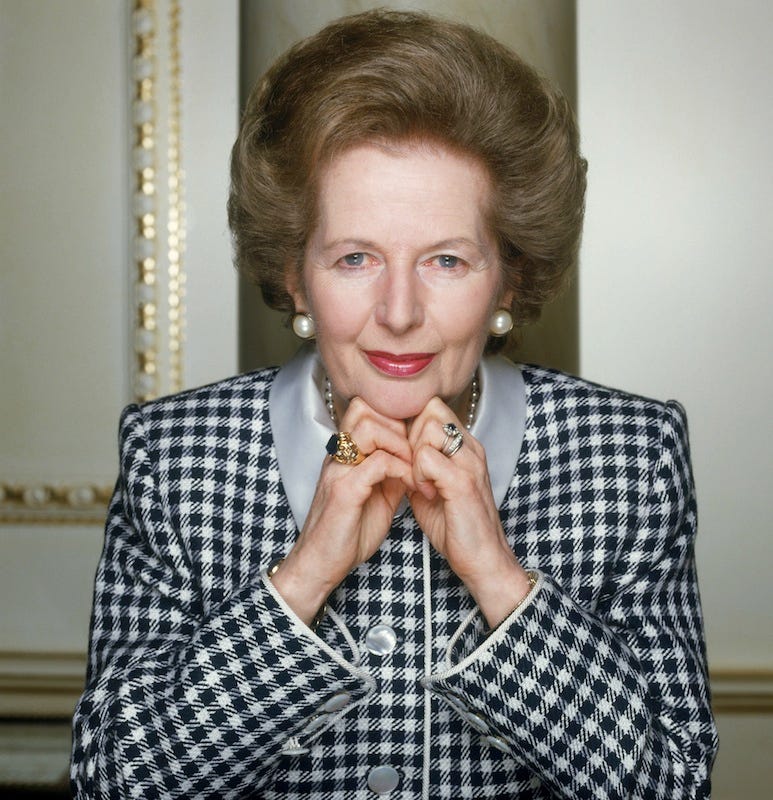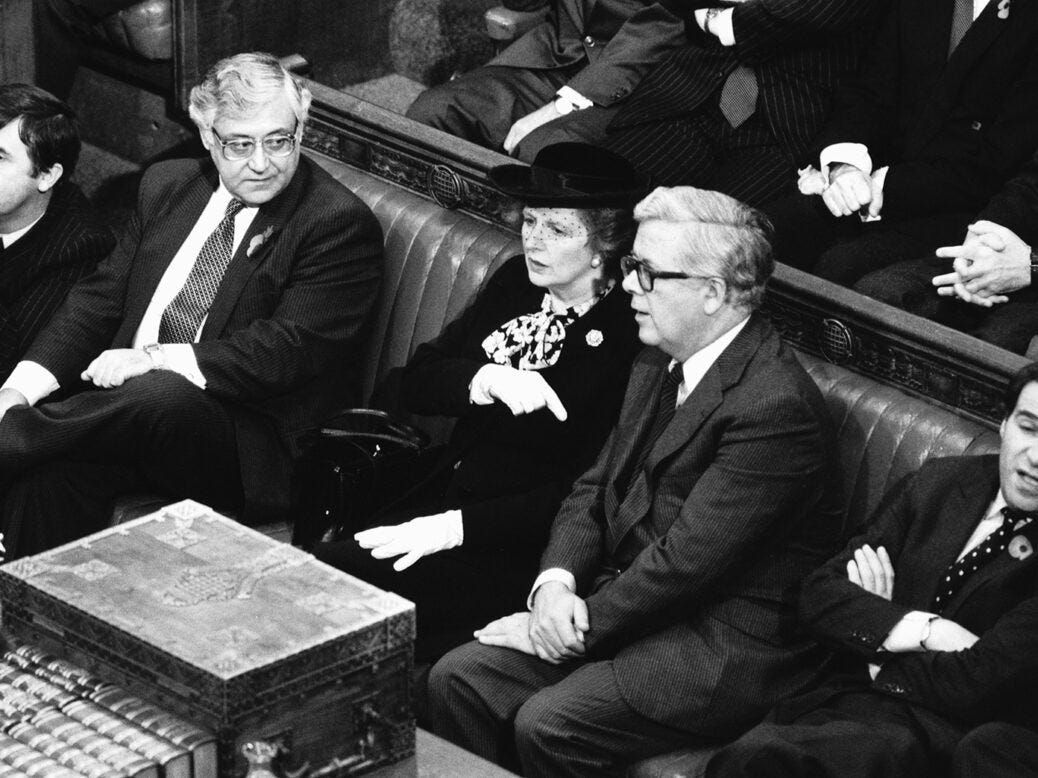I was very pleased to talk to Charles Moore, who I have read admiringly for many years. His three volume biography of Margaret Thatcher is one of the most interesting biographies published in the last few years. He also edited a volume of T.E.Utley’s journalism. In this discussion you will hear (or read the transcript below!) whether Margaret Thatcher is more left-wing than we think, what Charles thinks of political biography, how his footnotes work, who are the most underrated Thatcher cabinet ministers, the relationship between fiction and biography, why he’s not a natural Thatcherite, and more. I asked a lot of my questions much less elegantly than I had written them, but the answers are frequently models of spoken English. I particularly enjoyed Charles’ use of “jealous” in its original, perhaps now semi-archaic, meaning (i.e. suspiciously vigilant or careful). He also seems to use “cunning” in the way Johnson defined it, pleasingly. I remember reading once how much Charles enjoyed the language of the Book of Common Prayer as a child. Perhaps those lexicographical waters run deep. The transcript is lightly edited for intelligibility. You will notice, sometimes, that the transcript moves from past to present tense when Charles talks about Margaret Thatcher. Here, as elsewhere, he often refers to her in the present tense. One topic we didn’t cover was Margaret Thatcher as a late bloomer. Maybe another time.
Henry: You once wrote that you found political biography boring to read, or you used to. Why did you find it interesting to write?
Charles Moore: I think making one's own enquiries makes you think about it more deeply, which is intrinsically interesting. But also I think the subject, Mrs. Thatcher, is a particularly interesting person because she was very unusual and because she was the first and, effectively at the time, only woman. And so everything's different. And so the impact of her is very strikingly different from that of even very well-known male politicians.
Henry: And do you enjoy reading political biography more now that you've written your book?
Charles Moore: I don't find that I do read it more, particularly. But probably the answer's yes because I can understand more how the work is done. And therefore, I can see who's good at it and who isn't, and when they're evading a subject they don't understand or whether they've really got to the bottom of it and so on.
Henry: How do you assess that? What sort of things make you think that someone's really got a grip on what they're telling you?
Charles Moore: Partly it's their mastery of the sources, of course. And also, it's a matter of, to some extent, perceiving their fairness. And I think that's quite an interesting subject, because fairness doesn't mean, necessarily, that you're neutral about the person. You can be highly sympathetic to the subject, or you can be even unsympathetic to the subject and still be fair. But fairness is something about considering the evidence and trying to give it its right weight. This, I think, is easily detectable in biographies. And some just don't do that. They wish to assassinate the character, or they wish to make a hero of the character, or they're simply rather lazy. If you've walked down that path, you can detect what's going on.
Henry: What parts of Margaret Thatcher's life did you find it most difficult to be fair about?
Charles Moore: Well of course, I wouldn't be the best judge of that, I suppose.
Henry: Were there any bits, though, where you had to work at that practise of fairness?
Charles Moore: One way in which you need to be fair to a subject is simply to try to understand the subject. I don't mean the biographical subject. I mean the issue. And there are certain subjects that I'm less good at and, therefore, have to work harder on like, let's say, monetary policy or details about missiles. Neither of which are my natural territory, and both of which are important in the case of Mrs. Thatcher. So I would have to make more efforts about that, mental efforts, to really understand what's going on than I would about, say, fighting an election or reform of the trade unions or something like that. There's a sort of broad point about being fair, which is that biography naturally and inevitably and rightly must focus on the individual. And therefore, it may do that to the exclusion of other individuals or of a wider milieu, which is an inevitable danger but is also a mistake because the individual in politics doesn't act alone, even a very remarkable character like Margaret Thatcher or Winston Churchill. And one needs, somehow, to convey the milieu and the weight of the other characters while never ceasing to focus on the one character.
One of the extraordinary features of Hilary Mantel's novels about Thomas Cromwell — Wolf Hall etc — is that, I think it's right to say, he is in the room the entire time, or in the field or whatever. I think Thomas Cromwell is in every scene. Sometimes it's reported speech that he's hearing, but still. And, as a biographer one sort of does that. Mrs. Thatcher is almost always in the room, not absolutely always. And that's right. That's fine. But one mustn't let her crowd everything else out.
Henry: Were the Mantel books a conscious model or influence for you, or is that something you've noticed separately?
Charles Moore: Not really because I was reading them more towards the end. Well, I read Wolf Hall quite a long time ago, and then I read the other two pretty much when I was finishing. But I think they're very good. Obviously, they're not biographies. But I think, I hope, I learnt something from them because there's a sustained effort of the imagination, which the novelist has to have, to see through the eyes of, in her case, Thomas Cromwell. And though biography is fact not fiction, imagination is required in biography as well. And so in some ways, it's a similar task.
Henry: On this question of the milieu that Margaret Thatcher was in, you paid a lot of attention in the three books to the biographies of all the people around her, especially in footnotes, but also when you're describing events such as the leadership election in 1990, there's a lot of biographic information. Is this compilation of brief lives, a way of providing not just information, but commentary, almost like a sort of prosopographia? What stood out to me was that, even just through the footnotes, it really details the way that she was very, very different to everyone else in that world, demographically and socially.
Charles Moore: Yes. That's right. So, in putting footnoted autobiographies of most of the characters, that's useful for reference, but it's also a sort of short-hand way of telling you about the milieu and the range of characters she was dealing with, and of course, it brings out the fact that they're almost all male and a very high percentage of them went to public schools and Oxford or Cambridge. She of course went to Oxford, but she didn't go to public school and she wasn't a man. So I think when your eye goes to bottom of the page and picks up one of those biographies, it should be helpful in its own right, but it also should have a cumulative effect of placing Mrs. Thatcher among all of these people and of course, rather like the only woman in the room is very noticeable physically, she's very noticeable as unique in this milieu.
Henry: Is that a technique that you took from somewhere, or is that something that you devised yourself?
Charles Moore: Well, I think she devised it to some extent, and I picked up on that. She always had to wrestle with the point that it was considered a disadvantage to be a woman in the world in which she was moving. And she realized that though in certain respects it was objectively a disadvantage because of prejudice and so on, she could turn it to advantage. And I think one thing she understood very early on, because though she's a very sincere person she's also a very good actress, is that she could see the almost filmic quality of her position. So she would know that the camera would come in on her, and therefore she should exploit that to the full with her hair, her bag, her dresses, the sense of being different and noticeable, her voice. And she put that to good use and tried to refine that and simplify it really so that it could have maximum impact.
Henry: There was a High Tory ambivalence about Margaret Thatcher, so someone like T.E Utley was a supporter, but not a complete supporter, a slightly guarded pro-Thatcher. And I think you potentially fall into this group, not entirely aligned with the Thatcher government on Ireland, Hong Kong for example. How did this position affect you as her biographer?
Charles Moore: I don't think my own specific views on political questions were so important in that, but I think perhaps my overall approach affected it. What I mean by that is that my background, I'm actually brought up as a liberal with a big “L” — Liberal Party. And by cultural inclination I wouldn't be a natural Thatcherite, and I would always look at Mrs. Thatcher as somebody different from my way of thinking in that sense, which of course makes that very interesting. I'm not part of her tribe, and wasn't by upbringing, and I hope that's useful because it gives a certain historical detachment. However I wasn't trying to write an interpretation of Mrs. Thatcher coming from my tribe, it wasn't like the Whig interpretation of history sort of thing. And indeed, in some ways, I was more impressed by her because I came from a different tribe, that's to say, she had to overcome more barriers in my mind, perhaps. Suppose I'd been writing a biography of Asquith, that would have been more like the world I grew up in, and perhaps less of a challenge. And writing about Mrs. Thatcher, it's exciting to enter a world which in social terms and political terms, and of course, a different sex as well, was less known to me.
Henry: I think you wrote that she is, with the possible exception of Jim Callaghan, the most socially conservative Prime Minister that Britain has had. To what extent do your background and your personal views make it easy or difficult for you to be, as you said earlier, fair in the way that you presented that?
Charles Moore: She's a very odd mixture in that way. I think I perhaps did write that. But of course, she also was such a change bringer. If you think of Mrs. Thatcher's natural demeanour and reactions, she would be very socially conservative. I mean not ultra socially conservative. For example, she married a divorcee, which was quite unusual in 1951. But a fairly conventional Christian, starting as a Methodist and sort of sliding gradually into Anglicanism as she rises up the social scale without ever abandoning Methodism. Believing strongly in firm punishments for criminals. A very uncomplicated monarchist. No problem about hereditary peers in her mind, etcetera, etcetera. Very fond of obvious traditional British things like the armed services, support for the police, all that sort of thing. And things like traditional high standards in school of a rigorous kind. So on and so on, all those things. But in another way, she's so impatient to change things and unafraid of challenging whatever it is that people usually go around saying. So it's a curious combination and an interesting one. For me, I don't remember that presenting a particular fairness issue. It's just this funny thing about her, which is also biographically very interesting, that she's very, very conservative and very, very radical.
Henry: Do you think the fact that you have religious belief. Do you think that had any part in the consideration to pick you as the biographer? I think you've said before, you don't really know why she chose you.
Charles Moore: No, I wouldn't have thought that it did have any consideration. Mrs. Thatcher's religion was quite vague, and she wasn't interested at all in ecclesiastical or theological questions. But one of the things she respected in religion was some sort of seriousness about ultimate purpose. And she certainly had such a seriousness herself. And I remember talking to her about that. This is before I was engaged in the work, I think just in conversation. I had recently become a Catholic, and she talked about that. This is another interesting example of her, in some ways, rather open mind because she's fundamentally brought up anti-Catholic as most English Protestants were. And I don't think she would ever have considered becoming a Catholic. But I remember her being rather pleased that I had become a Catholic because she thought this is a proper serious Christian thing to do, and it was something she respected. She felt this about Jews too, obviously they weren't Christians. But again, she had a respect for Judaism and Judaic law and custom and manners and thought. And that was something which she recognised and liked in other people.
Henry: Margaret Thatcher is sometimes thought of, or dismissively described, as un-philosophical. You said in your prefaces that she would confound Socrates with her lack of reflection on her own life. But in some ways she was quite an ideological person, at certain times, about freedom and things. Is the difference between being philosophical and ideological really so great? And was she really living if not a philosophically reflective life, a very philosophical life in what you've just been saying about seriousness and purpose? Is she more philosophical than she looks?
Charles Moore: Yes. Good way to think about it, I think. Alfred Sherman, with whom she fell out but who was close to her in the '70s, said that “she is not a person of ideas but a person of beliefs.” And beliefs, he said, are better than ideas. I think he meant better from a political point of view, for politics. And I think that's sort of right. So there was a sense in which Mrs. Thatcher was philosophical, which was that her mind was an enquiring one. And she was always thinking, thinking, thinking. “What's right here? What's the best? What's the problem? What's the solution?” But she didn't have the philosopher's sceptical mind or pure intellectualism. She wanted results. And she wanted good things to happen and bad things to be stopped. And so she did have what you could call a philosophy, but she was not a philosopher. She was a person of action and beliefs.
Henry: I heard an interview with you recently where you, I'm going to paraphrase, you said something like the limitation of left-wing political thought is that it has a utopian belief in politics. As in, if everybody only could have the right politics, everything would be okay. And you've written and talked about Margaret Thatcher trying to create a Christian Social Order in Britain. And that's really the drive she had. Is she, in that sense, a bit more of a "left-wing" political thinker, with a more utopian vision, than we would typically think of her as being?
Charles Moore: There is an element of that because she is partly a preacher in politics. There's an element of, some sense in her mind of building Jerusalem or rebuilding Jerusalem, I think is there. And that tends to be more associated with socialism and, indeed with certain forms of Protestant Christianity going back, than with conservatism. So there is something of that. However, one of her beliefs, which was true — I mean, which she did adhere to — was that politics doesn't contain the solutions of everything, because people do not political structures. And she did believe that. Though of course, she also, because she was very egotistical, she did believe that something which she ran was bound to be good. So she could accommodate. People said she was very intolerant of other ideas. She was certainly very argumentative. But for example, she respected the Labour Party. She didn't respect the Liberal Party, but she respected the Labour Party because she thought that it represented something in Britain that ought to be represented and that conservatism didn't really represent, the way she put it was that it was the party of the underdog. And she thought there should be a party of the underdog.
And her own approach to the problem of people who are less successful and poorer and things like that was to open up their opportunities. But I think within that was also a sort of acknowledgement that not everybody can take those opportunities. And for those people, it's important that there be a party that represents their interests. And she thought that Labour was the party to do that. So that shows a certain sense that, “I, Margaret Thatcher, don't have the answer to everything. I'm trying to do a particular set of things, and I believe I can do this right. But life is bigger than that, and politics is bigger than that.”
Henry: On the question of her being argumentative, or however you want to phrase it, you have that great memo, I think from 1981, that someone in her office wrote to her...
Charles Moore: Oh, John Hoskyns?
Henry: Yeah, yeah. And saying everything that gets quoted about her. But actually, after that memo, she was in power for another nine years. Should we be quite cautious about this idea that she was single-minded, not consensus-minded, a rude person? Should we try and be revising that image of her and saying that actually that was a more narrow part of her leadership style than is thought?
Charles Moore: Well, the famous Hoskyns memo was very powerful and contained criticisms which were true. But it's also a sort of protest because he was feeling that she wasn't listening to him. And also she had certain completely maddening qualities, if you were working with her every day, which he had to get off his chest. One of them was, the less sure she was about something and the more tired she was, the more rubbish she talked. And she could, in a tight corner, particularly before she'd made a decision, burble on a great deal and criticise others for a problem which really rested with her because she was psyching herself up to do something. And that happened a lot in certain economic decisions where she was worried about their unpopularity. She might argue with Geoffrey Howe or, later, Nigel Lawson about putting up interest rates, which she was almost always against. They were quite often in favour of it. And she used this tactically and psychologically, I think without realising it. And it could be a nightmare to live with, but leaders perhaps have to be a bit of a nightmare to live with some of the time.
The other thing was that because she was so jealous of her position and felt so fragile in her position as the only woman and the leader that she sort of knew people would like to get rid of, she had to — she thought, at least, that the way to deal with this is to be extremely forceful and not to be seen to give in. An upper-class man would tend to think that the graceful and sensible thing to do would be to give in and say, as a tactical thing, to say, “I'm frightfully sorry. You're completely right. I've got this completely wrong.” And she never felt she could do that. She felt she had to maintain her argument, her position at almost all times. But it didn't mean that actually she paid no attention to the criticisms or that she never altered her views because she would always claim consistency, which might not, in fact, always be there. And that was, again, a sort of technique of hers. And so she was more consensual and more pragmatic than she would admit. Her colleagues often find that hard to understand because she didn't want them to understand it. She wanted them to think that she was iron and immutable and unchangeable and, as she would put it, staunch. And actually, there was a lot more subtlety, and a sort of listening, than she or they would acknowledge.
For example, trade union reform. She was always complaining about Jim Prior going so slowly, but actually she did, herself, want to go slowly. She had a great impatience which made her want to get reforms in and bring about the changes, but she also knew that she mustn't make the mistake of Ted Heath of doing one great big law all at once. She must do it bit by bit. And so she was much more pragmatic in what she did when about trade union reform than she would say she was being.

Henry: You found some new material about Thatcher, particularly from when she was a young woman to do with boyfriends and letters to her sister and things that inevitably gave a much broader view of her character than we were used to from the television and the news and so forth. How did that change your view of the way she operated politically?
Charles Moore: I think it confirmed something which I sensed, but it brought it out much more clearly, which is what a cunning person she was. I didn't mean that in a nasty way. Her self-description was of somebody who just knew what’s right and does it. But it wasn't like that. She did have a strong moral sense and she did have strong convictions, but she also had very strong ambitions and a sense of when to do something and when not to do something.
So if you look at Margaret Roberts that she then was, wondering whom to marry, it’s the female equivalent of what nineteenth century novels used to call the choice of life for a man, which is often depicted in 19th and 18th century novels. A young man goes out to the world. What does he want to do? Does he want be a soldier or a lawyer, or whatever it might be. And how is he going to shape his life? And she was thinking a lot about that. She wanted, in the case of marriage, she definitely wanted true love, she is a romantic person, but she also wanted security, financial security, and a sense of a man she could look up to, almost certainly older, or very unlikely that anyone she would marry will be her own age, I think would be fair to say. And her most serious boyfriend was twice her age and then Dennis was 11 plus years older than she.
And you can see her particularly in the year 1951 when she has three serious boyfriends, one of whom was Dennis, weighing up. One’s a farmer. Does she want to be married to a farmer? No. One is a distinguished doctor. Yes, but he is a lot of older than her. And then there’s Dennis who had had a good war and had his own business, but on the other hand was divorced. And so she’s thinking, wouldn't perhaps put it to herself like this, “How am I going to be an MP? Maybe even, how am I going to be a minister? Maybe, maybe, even how I'm I going to be Prime Minister.” Though I'm be much less sure about that, this is all very early on. But also, “How am I going to marry the right man and have children?” And these things are all going around and around in her head and influencing her decisions. “And how am I going to be able to support myself or be supported by a man. How will I have enough money?” Because she had no money from her family.
And so you can see this very ardent person, but also a person who thinks very carefully before she does something, she loves the expression, the well known expression, “time spent in reconnaissance is never wasted,” and I think she was always making reconnaissance.
Henry: The political scientist, Mark Garnett, has described Thatcher as banal. This is a quote from him, he says: “She was prepared to face down establishment institutions, if they opposed her. This defiance was not the product of a deep delayed plan: only interesting people engage in that style of thinking.” Is that a helpful way to think about Margaret Thatcher?
Charles Moore: No, I think it’s an unhelpful way to think about it, because what he’s not acknowledging is that she's a politician. So the point about being a politician is not, do you have a brilliantly original mind? But what are you capable of doing? And she’s extremely unusual in politicians for a sustained interest, sustained over a very, very long period in her case, in office, in the content of what she was doing. And therefore, she was thinking really hard about some questions. How do we end the Cold War? How do we beat trade union leaders? How to beat inflation? With a resourceful seriousness, which might not be intellectually original, but which was in a political sense, profound. To call it banal is mistaken, because actually nobody else was like that. There was simply nobody else in the first rank who was behaving and thinking that way. So it was original. It wasn’t original in the sense that Plato’s original, but in politics it was original.
Henry: Tyler Cowen has talked about the advantage of having or displaying what he calls autistic cognitive traits, so the ability, and the absorbing interest, to absorb a lot of information to categorize it, to order it, and to do this much more so than other people, along obviously with some other things. Do you think Margaret Thatcher displays those sorts of traits and did they, as I think you are sort of suggesting here, give her a political advantage and an advantage as prime minister?
Charles Moore: I wouldn't use the word autistic, and I know something about autistic behavior through my own family, my own wider family. I think it's probably not the right sort of categorisation, but I think Mrs. Thatcher had astonishing powers of application. And she did have the ability to, in order to apply herself to a subject, to shut out other ones, while she was applying herself. However, she was a vulnerable human being as well. And though she wasn't the best person at reading other people’s emotions, she was, in many ways, sympathetic to people. I mean, she could be very unpleasant to people. But she was really fond of some people and grateful to them and solicitous in their difficulties and conscientious in how she ought to behave to them. She was odd in the way that all great people are odd. I don't mean all great people are odd in the same way, but all great people are odd in some way.
But I don't think her mentality was quite as you described there. And I think she couldn't have survived in politics if it were because one of the things you have to do in politics is you have to have intuition about what other people are thinking. She constantly attended to what she thought voters were thinking, what was the public reaction to something or other. She wasn't obsessed with the media to anything like the degree that politicians are now, but she knew how to sniff the wind. And though she could be very brutal with colleagues, I think she did actually have powers of diplomacy which were put to very good use on the world stage, if you think of her relation with Reagan or with Gorbachev for example.
Henry: How much of what we call Thatcherism was actually Lawsonism?
Charles Moore: Perhaps they started out more or less together and diverged. And there was a lot in common. Before things went wrong, there was a strong alliance about that. But I think Lawsonism — I wouldn't call it an ism actually — but I think Lawson’s views about things were generally more economically based, as you might expect. There was less politics and more economics in it. And he was more thoroughly liberal in economics than she. Whereas she tended to see economics as the instrument. She did believe in free market economics, but she saw them more as the instrument of something wider. Whereas he was more interested in them in themselves, I think.
Then there’s a second point, of course, which takes us on to rather different territory that Lawson, like Thatcher — because, again, a big ego — suffered from feeling that if he was doing something himself, it was bound to be good. I think all important politicians tend to fall into this category. So it was sort of self-evident to him that if he was Chancellor of the Exchequer it must be better than anybody else being Chancellor of the Exchequer. And this led him, after several successes, to a great mistake which was the whole attempt to get into the ERM and the shadowing of the Deutsche Mark in relation to that. Because it became a sort of totem about how you could manage Sterling, and it became a piece of alchemy or magic or a sort of hieratic thing, which only people of great brilliance could operate. And she, I think, had a wider view, a more common sense view about economic questions and how they weren't really like that. They didn't really depend on such calculations but on things that are, in a certain sense, simpler. Lawson was much the superior economic brain to hers, but I think he was more defective politically and didn't understand. I think there's a reason why he couldn't ever have been Conservative Party leader, though he was a very distinguished Chancellor of the Exchequer.
Henry: Who are the most underrated Cabinet ministers from Margaret Thatcher's governments?
Charles Moore: Well things went wrong for Geoffrey Howe. It's perhaps forgotten that he was a very good Chancellor of the Exchequer. In some ways he was a very good Foreign Secretary, but he was perhaps too indecisive and too sort of official minded. Howe was also very important in Thatcherism, though he didn't really like Mrs. Thatcher much. Richard Ryder described him as the tapestry master of Thatcherism. I think it’s a very good phrase. Howe actually preceded her in his interest in free market economics, even in the ’50s, ‘60s and ‘70s. She was interested, but he got there first very often. I think he was very important to her, in the early days, and of course, it was pretty disastrous when they finally fell out. And he was definitely a really high-class servant of the state.

I think Nicholas Ridley was so bad in public presentation and politics in that general sense that people didn’t realise what a competent Minister he was and what a good brain he had. I think he was temperamentally very unsuited to modern politics in some ways, but of all the ministers in her government I always found he was one most respected by officials interestingly. He was decisive, he would take responsibility, he wouldn't duck problems, he would think through things, he was a bit wild on the political aspects, but he was more impressive than people realised.
And then Norman Tebbit is an interesting one because of course, he suffered great difficulties because of the terrible injuries he suffered, he and his wife suffered in the Brighton bomb. So he may not have been such a good minister of a big department, but he did have the most formidable brain and the most tremendous capacity to express something very clearly and often amusingly. And so he sort of cut through both the people who agreed with him and people who disagreed with him. It was a very striking phenomenon, Norman Tebbit, and highly unusual in somebody who in formal terms was a middle to higher ranking rather than top ranking cabinet minister in terms of jobs. You never knew who he was and you had to watch out for him and his fierceness in debate his sort of rather spare eloquence, his toughness. All that was formidable.
Henry: We live at a time when so many of the essential moments in Thatcher’s political career can be watched on YouTube, and we can hear radio clips, and we can see her letters online, and it’s possible to imagine a sort of biographical Museum of Margaret Thatcher where you can be sort of immersed in her and in her world. What sort of challenge does that present to a biographer? There’s a sort of inevitable limitation in that Disraeli only exists on paper, but Margaret Thatcher exists in all these mediums. But you as a biographer only have paper.
Charles Moore: Yes, well of course I didn't only have paper in a sense that I only have paper on which to express it, but I could myself watch the clips, and indeed I saw them live frequently, because I was around at the time. I think it's very, very interesting and instructive to watch clips of Mrs. Thatcher and I'm always urging people instead of sort of theorizing about it to in television programs to show those clips because she had a tremendous gift of communication, even though sometimes the communication didn't please the recipients. She very, very clear and, in that sense, extremely good at getting a message across and that survives very well in the clip. So you can see her intent often much more clearly and strikingly than that of modern politicians and the sheer sort of emotional force she put into everything.
For example, you watch when she's answering questions on the day she resigned in November 1990, answering questions in the house and then doing the no-confidence debate. It's absolutely astonishing. Particularly in the questions. When if you keep bearing in mind that she has just resigned. So she's still Prime Minister, but she's tendered her resignation that day, and there she is, not a hair out of place, incredibly tough argument, really rather witty. And as she said at one point in the debate, “I'm enjoying this.” And sort of playing it for all it's worth and engaging with people from the other side. There's a sort of almost banter she has about the nature of the gap between the rich and the poor, I think it's with Jim Sillars, the Scottish Labour MP. And a bit of a ding-dong with Simon Hughes, the Liberal MP. And it's a very good theatre, and it brings home a lot of us. I think those clips are vivid.
And thank goodness for television interviews and news clips, because the House of Commons was not televised until 1989. So she'd been Prime Minister. It was on the radio all through her prime ministership, and not on the television. So we haven't got most of that on television. But we can see other things like Brian Walden interviews or news clips and so on. And they are really, really worth studying.
And you're right that, obviously, I can't convey that fully in a book. I can describe it, I can quote from it, but I hope that what would happen is when people read the book, they can get more out of the clips, and when they look at the clips, they can get more out of the book.
Henry: One or two general questions to close with. Who should write Tony Blair's biography?
Charles Moore: I don't know who should write Tony Blair's biography, at all. And I’m certainly not volunteering myself. But I think, again, the question of fairness is important, because Blair suffered from a thing where he received absurd adulation and then absurd vilification. And, actually, the judgment on him, the historical judgment on him, should be much more nuanced and requires some detachment. And speaking only for myself, I must have written, as a journalist, thousands, tens of thousands, maybe even hundreds of thousands of words criticising Mr. Blair and his policies. But I think he deserves to be taken seriously as a political leader and was important, and that his fundamental message about New Labour was actually true. He's often described as a liar, but I think his fundamental message about what he was and what he was trying to do was true, and people appreciated it. And it's also true, unfortunately, that a lot of his actions were rather ill-thought-out and didn't come to much, so that's a slightly tragic element in his time. But he deserves much more serious attention than the great majority of British prime ministers.
Henry: What are the most underrated political biographies?
Charles Moore: I think there are quite a lot that are overrated, but it would be invidious to say which. What I most value, but this is probably somebody who's in the trade talking rather than the general reader, but what I'm looking for, I want to feel very confident that the author is fair-minded, and it also has a sort of feel for what it is he's writing about. So that he is not somehow off the point or out of his depth, or, as it were, wasn't there. I didn't mean that a biographer has to have been present when these things happen, but I mean he doesn't have a feel for how, let's say, the House of Commons really works or something like that. I like, in that sense, the biographers that are a professional. I think that man D. R. Thorpe is good, for example. I'm afraid I don't have a biography of a modern politician (and by modern I'm going back quite a long way) to hold up and say, “This is it. This is how it should be done.” But this may well be my fault. I've read by no means all of them.
Henry: Charles Moore, thank you very much for your time.
Charles Moore: Thank you.
Don’t forget!
My salon, on 1st March, TONIGHT, is Samuel Johnson: Reading for Wisdom where we will discuss pessimism, pragmatism, and the good life. The attendee list has some interesting Johnson enthusiasts — join them!
My am giving a tour of the City of London tracing the route of the Great Fire and the genius of Christopher Wren on Saturday 5th March.














Charles Moore interview